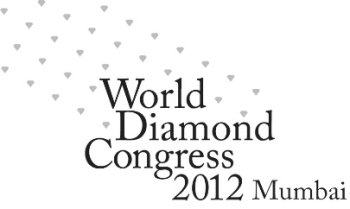No Generic Promotions is Industry’s Biggest Worry, Diamond Congress Told
October 15, 12
 |
Another issues that came up at the meeting was the threat posed by undisclosed lab-made diamonds. The overarching issue is that all this needs to be dealt with in today’s uncertain economic environment.
These issues emerged on the opening day of the Congress that kicked off today. The congress is a joint initiative of the World Federation of Diamond Bourses (WFDB) and the International Diamond Manufacturers’ Association (
The lack of generic promotions globally for diamonds was first outlined by Bharat Diamond Bourse (BDB) President Anoop Mehta, one of the Congress' co-hosts. “We are facing a problem with the fact that demand for our product is falling,” he said in his conference opening remarks.
Gem & Jewellery Export Promotion Council (GJEPC) Chairman Vipul Shah, the other co-host, underlined this saying “Most importantly, we need to increase demand for diamonds as a category. We must make women believe that a diamond is forever and ethical.”
Rosy Blue COO Russell Mehta in his presentation listed the lack of promotions as his top issue for the industry. He noted that the De Beers Supplier of Choice (SoC) initiative was launched in acknowledgement of the fact that the industry needed to be more consumer-centric. “Today, a decade after the SoC was launched, diamonds have not been able to even track inflation, let alone keep up with nominal GDP growth,” he observed.
He went on to state that between 1995 and 2011, the global luxury industry grew from €77 billion to €191 billion. “Diamonds, supposedly the top end of the luxury pie, didn’t account for even a third of this value,” he noted. “What happens now that we have minimal promotions?” he asked, adding that the diamond’s symbolic value could not be taken for granted. “The diamond will not remain the symbol of love unless that message is repeatedly reinforced,” he concluded.
Throwing out some numbers to underline the issue, Mehta observed that if the annual outlay on De Beers’ generic promotions back when it did them were corrected for inflation, it would amount to between $350- and $400 million today. In comparison, Apple’s annual advertising spend was $1 billion and Microsoft’s $1.6 billion.
DTC CEO Varda Shine stated that some 5 billion carats of polished diamonds worth an approximate $1 trillion had been sold worldwide to date.
That the industry had to tackle this issue along with the others in an unpredictable global economic environment was underscored by WFDB President Avi Paz. “This is a critical time for the international economy as well as the global diamond industry. We are here to discuss the issues that face us and take courageous decisions,” he observed.
IDMA President Moti Ganz picked up the second issue when he observed, “Manufacturers, after having cut off all the other hands in the pipeline, are still not making even one dollar more than they were when all those hands were in the pipeline. And the only hands left to cut off now are our own.”
The issue of lab-made diamonds was brought up by Anoop Mehta, who noted, “Synthetics are a big threat today and only full disclosure will help restore confidence. Otherwise we’ll fail.”
An issue that took up much of the congress’ attention on the first day was the Kimberley Process (KP) and the calls to reform it. Susan Shabangu, South Africa’s Minister of Mines and Mineral Resources, said South Africa was open to fresh perspectives. “We agree to a review of its objectives and a review of definitions. We also want a review of the way decisions are arrived at in the KP,” she said.
Current KP Chairperson Ambassador Gillian Milovanovic of the U.S. however pushed for the industry to accept change. “The KP needs to adopt a new definition of conflict diamonds and I seek industry involvement in this. The KP is not a ‘take it or leave it’ business. I understand that changing the definition of conflict diamonds will bring old issues up. But I am convinced that change will also bring stability to the industry.”
She said that KP should operate side-by-side with other review systems.
“The WDC is looking at the KP and its relevance as far as what it is doing," said World Diamond Council (WDC) President Eli Izhakoff. "We don’t want the KP to work in the area of human rights violations – it should stick to its mandate. In this regard, the KP chair’s idea is the basis for change.”
Izhakoff emphasized, however, “The World Diamond Council (WDC) manages the polished trail.” He went on to say that there needs to be a toughening of the peer review system.